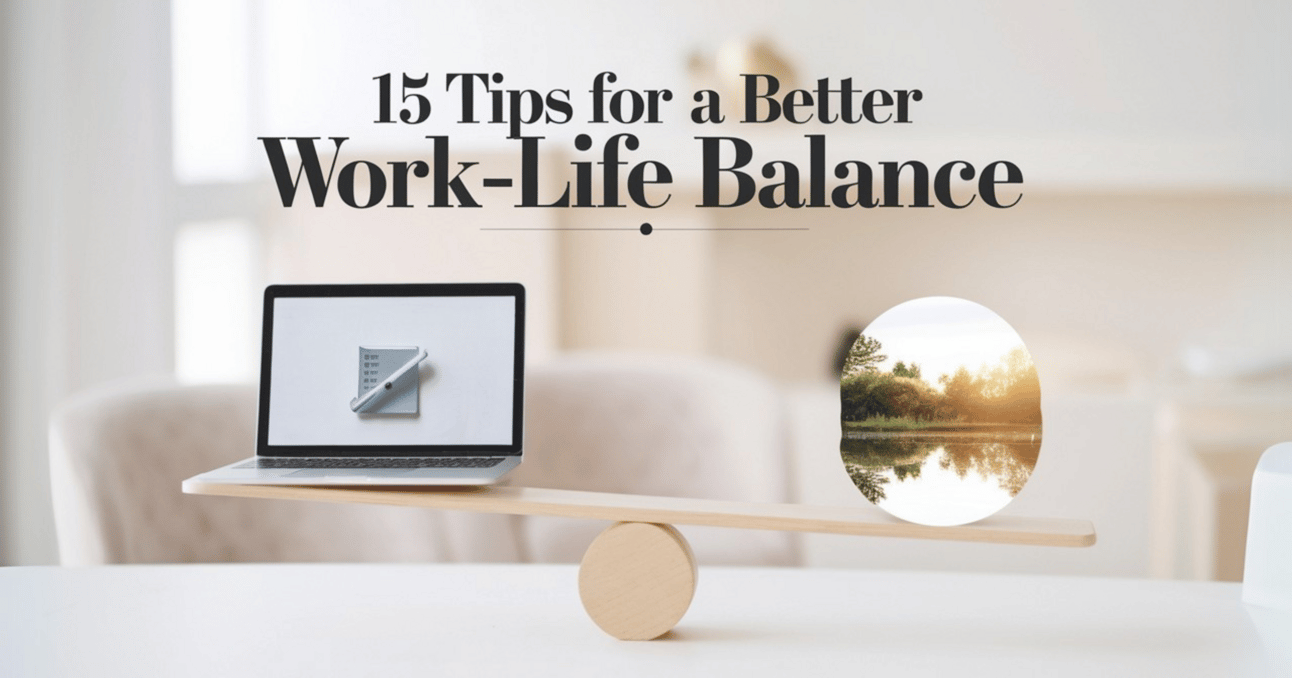First time reading ? Sign up here.
Struggling to juggle work, family, and personal time?
As a busy parent, it can feel like there’s never enough time in the day. With work commitments, household responsibilities, and caring for your children, achieving a healthy work-life balance might seem impossible. But finding harmony between your professional and personal life is not just a dream, it’s essential for your well-being and happiness. Here are 15 practical tips to help you reclaim balance and reduce stress in your daily routine.
1. Identify Your Priorities
The key to balance is identifying what truly matters—career, family, health, or personal time. Once you define your top priorities, you can direct your time and energy where it counts.
Use a priority matrix to sort tasks by importance and urgency. This helps you focus on what matters most, reduce stress, and make your day more manageable.
2. Set Clear Boundaries
As a busy parent, clear boundaries are essential to keep work from taking over your personal time. Without them, it’s easy for emails, meetings, and deadlines to creep into family moments.
Define your work hours and stick to them. If you work from home, create a dedicated workspace to mentally separate work from home life.
Communicate your availability with your employer, coworkers, and family. Let them know when you're working and when you're off the clock. This helps ensure your time is respected, allowing you to be fully present with your family after the workday ends.
3. Learn to Say No
It’s easy to say yes to every request, but overcommitting can lead to burnout.
Learn to say no when you need to. Politely but firmly decline tasks or activities that don’t align with your priorities or that you simply don’t have time for.
Saying no lets you focus on what matters and keeps your schedule manageable.
4. Plan Your Day
Good time management is essential for work-life balance. Start each day by planning your tasks.
A daily to-do list or digital planner can help keep you organized. Make sure to schedule both work-related tasks and personal activities. Don’t forget to include breaks and time for self-care. Planning your day helps you stay focused and ensures you have time for both work and personal life.
5. Prioritize Self-Care
Self-care isn’t optional—it’s essential. Prioritizing your well-being gives you the energy and clarity to manage daily demands.
Set aside time for activities that recharge you, like exercise, meditation, or hobbies. Treat self-care as a non-negotiable part of your routine, just like any other important task.
6. Delegate Tasks
You don’t have to do it all. Delegating tasks at work and home eases your load and reduces stress.
At work, hand off tasks when possible to free up time. At home, share chores with family or outsource when needed. Smart delegation lets you focus on what truly matters.
7. Optimize Work Hours
Work smarter, not harder, to boost productivity during work hours.
Use techniques like time blocking or the Pomodoro method to stay focused and efficient. These strategies help you complete tasks faster, giving you more time for yourself.
8. Utilize Remote Work Options
If your job allows remote work, take advantage of the flexibility it offers.
By skipping the commute, you gain extra time for personal activities like exercise or family time. Set up a dedicated workspace at home to stay focused and maintain a routine that keeps work and personal life separate.
9. Take Regular Breaks
Breaks are essential for staying energized and focused. Short, regular breaks throughout the day prevent burnout and keep you refreshed. A quick five-minute walk or deep breathing exercises can boost your productivity and enhance your well-being.
10. Make Time for Family and Friends
Work is important, but so are your relationships. Set aside time for family and friends.
Whether it’s a weekly dinner, weekend outing, or a simple phone call, regular connections strengthen your relationships and offer emotional support, helping you maintain balance.
11. Unplug from Work
In a constantly connected world, unplugging is key to work-life balance. Set a daily cutoff for work devices and focus on personal time. Create an end-of-day routine, like a walk or a hobby, to signal the transition. Disconnecting helps you recharge and be fully present.
12. Plan Mini Getaways
A change of scenery can boost your mental well-being. Plan mini getaways, even just a day trip or weekend escape.
Short breaks help you relax, disconnect from work, and recharge—no need to wait for a long vacation to feel the benefits.
13. Practice Mindfulness
Mindfulness helps reduce stress and improve focus by keeping you present in the moment.
Incorporate it into your day with meditation, deep breathing, or simply noticing your surroundings. A mindful approach brings more calm and clarity to both work and life.
14. Set Personal and Professional Goals
Clear goals keep you on track in both work and life. Regularly review and adjust them as needed.
Break big goals into smaller steps and celebrate progress along the way. Aligning your actions with your goals leads to a more balanced and fulfilling life.
15. Embrace Flexibility
Work-life balance looks different for everyone, and that’s okay. Stay flexible and adapt as your needs evolve.
Adjust your schedule, shift priorities, or try new strategies—being adaptable helps you maintain balance, even during busy times.
Final Thoughts
Work-life balance is a journey, not a destination. These 15 tips can help you take small but meaningful steps toward a more fulfilling life.
Balance isn’t about perfection—it’s about creating a rhythm that works for you. Start with the tips that resonate most, adjust as needed, and be kind to yourself along the way.
With time and consistency, you can build a life where both work and personal time thrive.
Until next time,
Hope this helps!
Talk soon, Stay well
— Be Well Hacks Team
